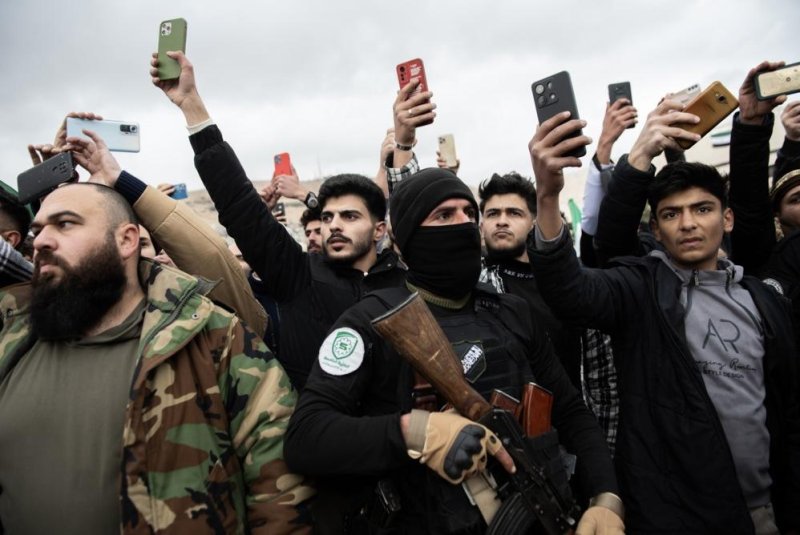People take photos as Syrian opposition fighters hold a military parade in Damascus, Syria, on Friday. Members of Hay’at Tahrir al-Sham, or HTS, marched to send a message of strength and reassurance to the people, according to HTS. Photo by Hasan Belal/EPA-EFE
BEIRUT, Lebanon, Dec. 27 (UPI) — Syria’s new government has been facing new challenges with unrest emerging in certain regions amid a growing number of violations and acts of revenge that increased the fears of the country’s minorities, especially the Alawites and Christians, Syrian analysts and experts said.
The quick downfall of President Bashar Assad and his Baath Party regime, the rather peaceful takeover of most of the country by the Syrian rebels and assurances by their leader, Abu Mohammad al Jolani, now using his real name Ahmad Sharaa, have fueled optimism about the country’s future.
Sharaa, the head of the Islamist rebel group Hayat Tahrir Al-Sham, or HTS, and presently Syria’s de-facto ruler, has promised to rebuild state institutions to ensure the forming of a “strong and efficient” governance system and framing a new constitution. He has also pledged to protect the minorities.
He named Mohamed al-Bashir as caretaker prime minister to lead the interim authority until March 1, arrange the transfer of power and prevent Syria from descending into chaos.
For most Syrians, who fought the Assad regime for 14 years, the most important element is to preserve the country’s unity and engage all constituents to form a unity government in which the many ethnic and religious communities are represented and fulfill people’s aspirations for a civil state.
Caution and fears have started to emerge, however. Sharaa has been appointing more of his people in the government and key positions, while several security incidents and acts of vengeance surfaced.
“These are no more single, individual cases,” Rami Abdel Rahman, director of the London-based Syrian Observatory for Human Rights, said in a telephone interview with UPI.
Videos that circulated in the past few days showing the burning of a Christmas tree and setting ablaze an Alawite shrine triggered angry protests, with a few hundred people taking to the streets in Damascus and thousands doing so in the coastal cities of Tartous and Latakia in the heartland of the Alawite minority to which the Assad family belongs.
Abdel Rahman said the new authorities in Damascus should have issued a statement stating that those behind the attack on the Alawite shrine would be arrested, while they blamed “remnants” of the ousted regime for the Christmas tree burning.
“But what about the killings and humiliation?” he asked rhetorically, referring to several incidents in various regions in which armed men were seen in videos using “racial and sectarian terms” against Alawites or Christians and asking for their IDs at checkpoints.
Abdel Rahman said such incidents are causing “genuine fears for some and for certain sects about the future.”
“We don’t want this to happen in new Syria … to distinguish between the various sects. The time of oppression is over,” he said, counting a total of at least 280 violations, security incidents and acts of revenge since Assad’s fall Dec. 8.
Syria, he said, is “for all its people and not for a sect or ethnic component even if the majority is Muslim Sunni.”
Even the Sunnis have some fears because the new rulers are trying to monopolize power and the “religious speech,” according to Anas Joudeh, a political researcher and founder of the “Nation Building Movement.”
“They [new authorities] are acting with an accelerated speed to run and control the country … taking long-term decisions while they are a caretaker government,” Joudeh told UPI by phone from Damascus.
He explained that the protests were not about a Christmas tree or an Alawite shrine, but rather expressing “deeper fears by the people about their existence and life.”
Opposition figures living in exile since the Syrian revolution broke out in 2011 failed to return to join the new political momentum because of security concerns, he added.
Sharaa, who adopted a more moderate rhetoric and has distanced himself from his jihadist past, faces the challenge of not only easing the fears of the minorities, but also of controlling the radical groups among his alliance and others, like the Kurds, which “would not give up their weapons.”
“That only could happen within the framework of the state and as part of a political arrangement or power transfer, starting with an inclusive transition government,” Joudeh said.
The path is clear as drawn in an international roadmap for a peace process in Syria in line with the 2015 Security Council Resolution 2254, which proposed a 12-month interim phase that would end with a final settlement.
But two points under the resolution cannot be changed under any circumstances, according to Joudeh: Syria’s unity, sovereignty and independence and the political process that includes national dialogue and a new constitution leading to parliamentary and presidential elections.
The alternative — if security incidents and acts of vengeance continue — is either that the Syrians would seek self-protection in their own regions or plunge into a civil war that would end with the country’s partition, according to the analysts.
They dismissed the ability of the ousted regime or Iran, which was forced to withdraw from Syria, to stir disturbances — at least at this stage.
Abdel Rahman went a step further in warning of Turkey’s “ambitions in Syria” and attempts to attack the Kurds in the northeastern part of the country, saying that would lead to a” bloodbath.”
“Now that we are finished with Iran, we don’t want [Turkish President Recep Tayyeb] Erdogan,” he said, calling on the Arab countries to “interfere to prevent Turkey’s dreams in Syria.”
To balance the growing influence of Turkey, whose support of the Sharaa and his new government has been clear since their advance to overthrow Assad, Arab countries should step in, according to Joudeh who named Jordan and also Egypt, “which could be in greater danger” of any Islamist rule in Syria.
